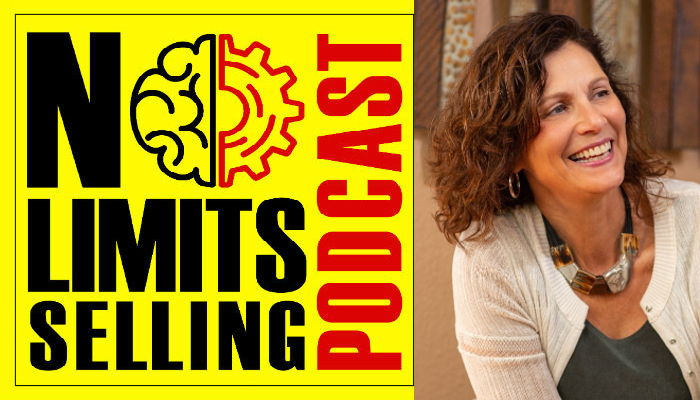Alice Heiman on Sales Strategies
On Episode 78 of The No Limits Selling Podcast, we have Alice Heiman, Podcast Host and Founder at Sales Strategies for CEOs with Alice Heiman. According to Forbes.com "Heiman is a diligent student and teacher of what works. She is among the world’s leading experts on the complex sale." Miller Heiman is original with 20+ years of growing sales organizations to greatness.
Alice demonstrates how sales performance is directly related to a leader’s mindset. When sales leaders change the way they work with sales teams, results are immediate and dramatic.
Virtual Keynotes, Coaching, and Training - over 10 years of experience presenting virtually
#SalesLeaders - Sales shouldn't be hard! Do you have a B2B, complex sale? Do your investors/shareholders expect double or triple-digit growth?
Is your team struggling to generate qualified leads? Is your team losing large deals? Will you hit your quota?
You are charged with growth. Your team must master the complex sale, shorten your sales cycle and build a sales plan that provides sustainable growth. You must focus on acquisition, retention, and growth.
Our clients have seen a 30 to 75% increase in their sales over the time we have worked with them. We have coached and trained sales organizations from start-ups to Fortune 100. It's exciting to see them crush their sales goals.

Contact Alice:
#nolimitsselling #podcastinterview
[EDITOR’S NOTE: This podcast is sponsored by No Limits Selling. It is a fun, fast-paced podcast that delivers hard-fought business advice that you can implement today to improve your sales and performance]
Interested In Our Real Estate Coaching Services? Explore Our Website: Link
Feeling Not Well Today? You Can Use Our Mindset Boosters App To amp Up Your Mood: Link
Find us on Social Media:
LinkedIn | Facebook community | Instagram
Like what do you listen to? Subscribe to our podcast!
Ready to become fearless? We can help you become fearless in 60 days so you accomplish more in your career Schedule A 15 min Call with UmarSummary
Introduction and Background
The podcast begins with an introduction to Alice Heiman, a renowned sales strategist and coach. Alice shares her background, explaining how she grew up in a family that owned a sales training company, which sparked her interest in sales. She discusses her journey from being a teacher to becoming a sales leader, emphasizing the importance of education in sales.
Alice's Sales Philosophy
Alice then delves into her sales philosophy. She believes that sales is about helping people solve problems and achieve their goals. She emphasizes the importance of building relationships and understanding customers' needs. Alice also highlights the significance of empathy in sales, stating that salespeople should genuinely care about their customers.
The Role of Mindset in Sales
The conversation shifts to the role of mindset in sales. Alice asserts that having a positive mindset is crucial in sales. She explains that salespeople often face rejection, and it's their mindset that determines how they handle it. Alice suggests that salespeople should view rejection as a learning opportunity rather than a failure.
Sales Strategies and Techniques
Alice shares some of her sales strategies and techniques. She advises salespeople to listen more than they talk during sales conversations. Alice also recommends asking open-ended questions to understand the customer's needs better. She suggests that salespeople should focus on the benefits of their product or service rather than its features.
The Importance of Sales Training
Alice discusses the importance of sales training. She believes that continuous learning and development are essential for sales success. Alice mentions that sales training should be customized to the individual's needs and should include practical exercises that mimic real-life sales situations.
Conclusion
In the podcast, Alice Heiman, a seasoned sales strategist, shares her insights and strategies on sales, emphasizing the importance of empathy, understanding customers' needs, and maintaining a positive mindset. She underscores the significance of viewing sales as a problem-solving and goal-achieving process, rather than merely a transaction. Alice also highlights the role of active listening and asking open-ended questions in understanding customers better. She advocates for continuous learning and development through customized sales training that includes practical exercises.
In conclusion, Alice's sales philosophy revolves around empathy, customer understanding, a positive mindset, active listening, and continuous learning, all of which are essential for success in the sales field.
Questions & Answers
Who is Alice Heiman?
What is Alice Heiman's sales philosophy?
How important is mindset in sales according to Alice Heiman?
What sales strategies and techniques does Alice Heiman recommend?
Why does Alice Heiman emphasize the importance of sales training?
What are Alice Heiman's closing remarks on sales?
Don’t miss this opportunity to transform your real estate career with one-on-one coaching. As an experienced real estate coach, I, Umar Hameed, am dedicated to helping you unlock your full potential and achieve your real estate goals. To learn more about who am I and my clients ↓
If you’re ready to take the next step, book an appointment with me today and begin your journey toward success in the real estate industry.
